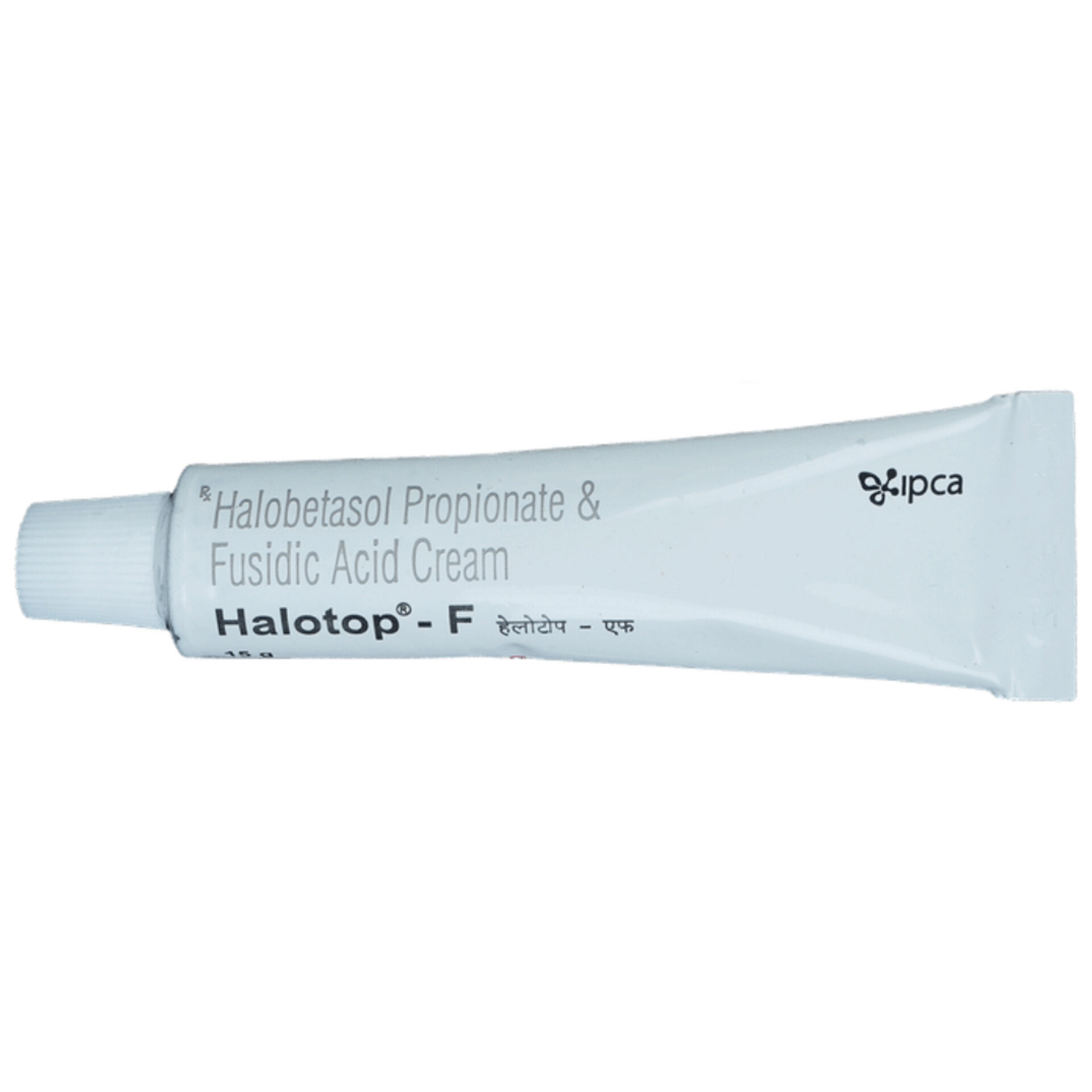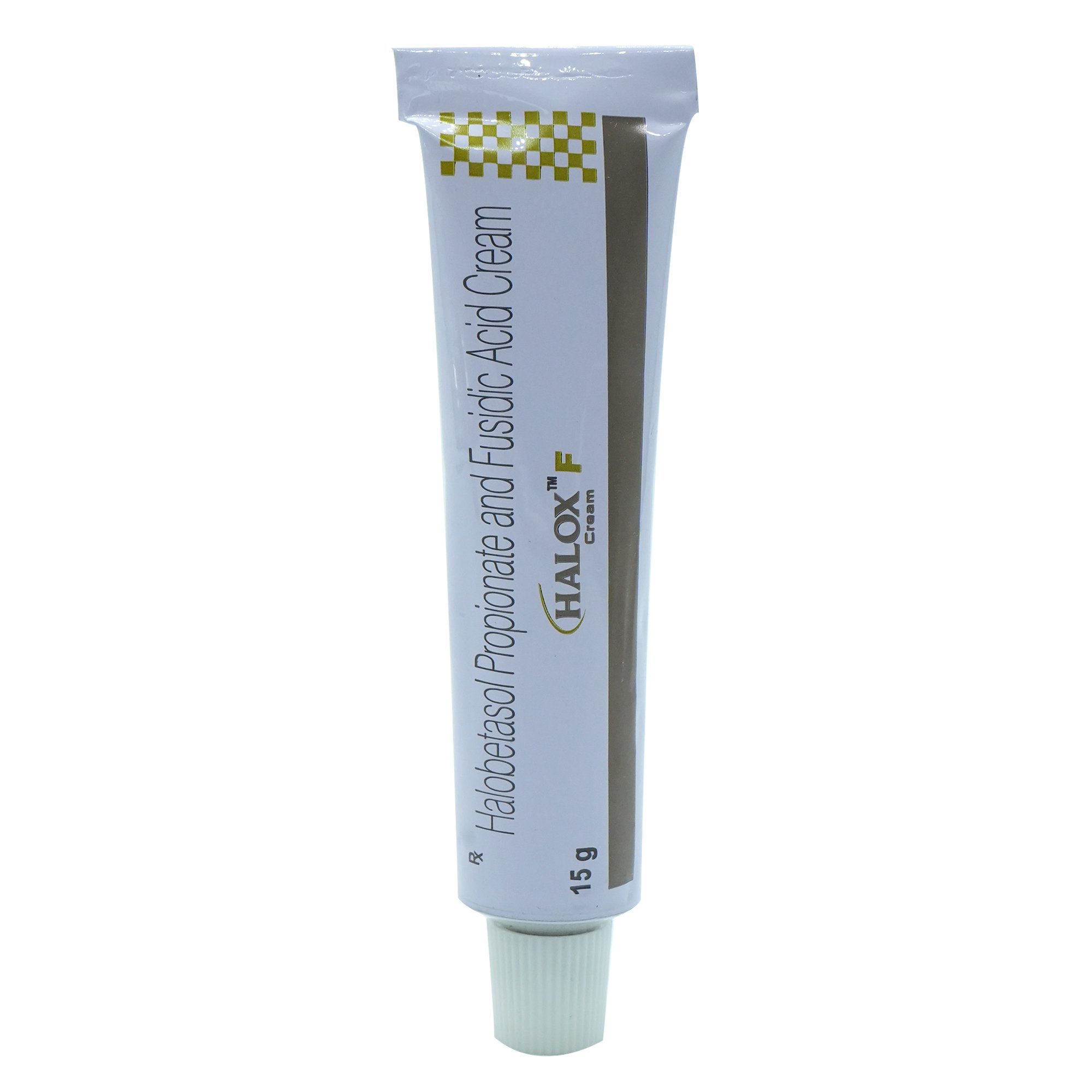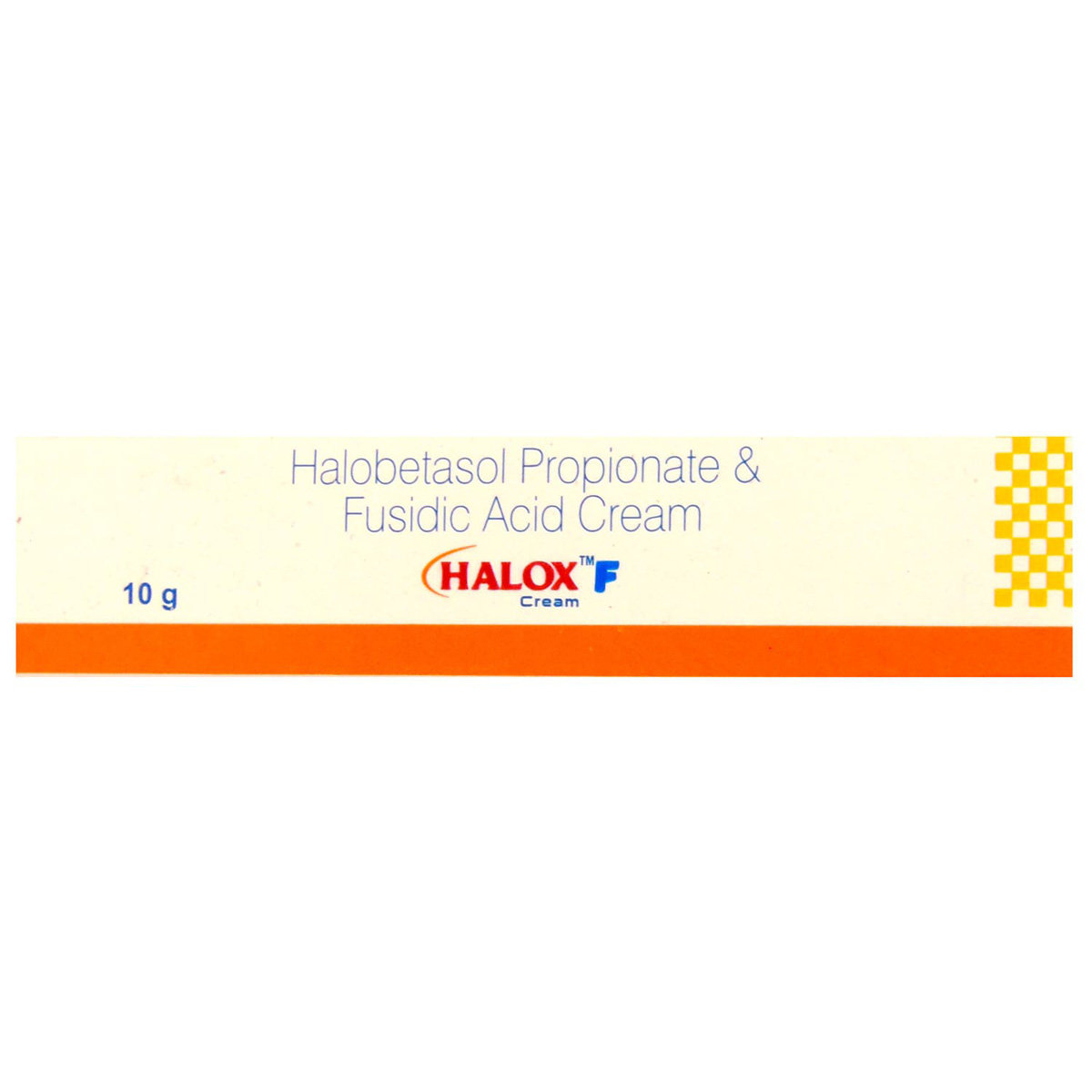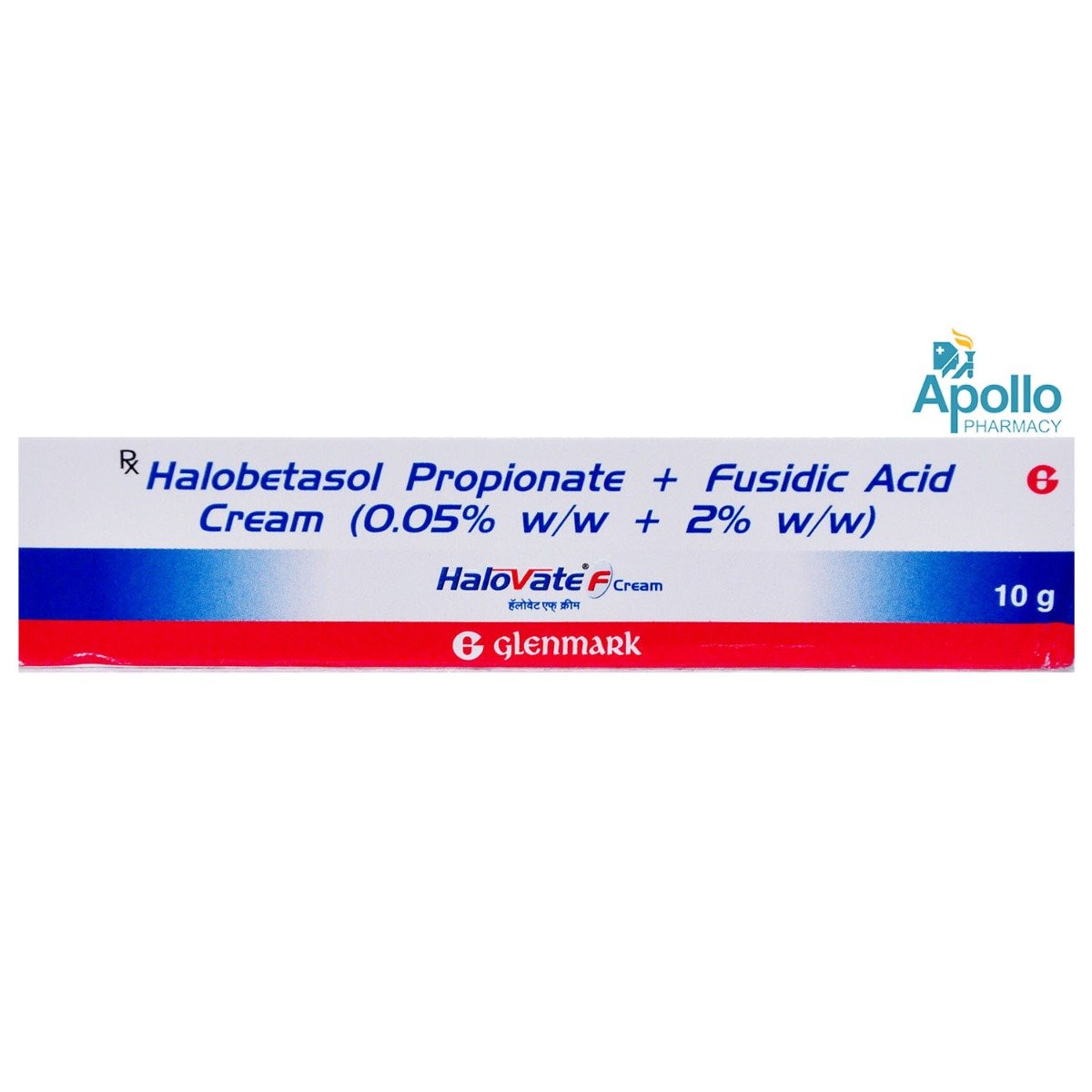Halobet F Cream 10 gm






MRP ₹203
(Inclusive of all Taxes)
₹30.4 Cashback (15%)
Provide Delivery Location
Online payment accepted
 Prescription drug
Prescription drugWhats That
Composition :
Manufacturer/Marketer :
Consume Type :
Return Policy :
Expires on or after :
About Halobet F Cream
Halobet F Cream is a dermatological medication primarily used to treat bacterial skin infections, such as eczema and dermatitis. Bacterial infection occurs when harmful bacteria grow in the body and causes disease. It can infect any part of the body and multiply very quickly. Eczema is a condition in which skin patches become inflamed, itchy, cracked, and rough. Some eczema types can also lead to blisters (a small bubble on the skin filled with serum and caused by friction, burning, or other damage). Dermatitis is a skin condition that causes itchy, dry skin or a rash on swollen, reddened skin.
Halobet F Cream contains Halobetasol (corticosteroid) and Fusidic acid (antibiotic). Halobetasol belongs to the class of high-potency topical corticosteroids. Corticosteroids have anti-inflammatory, immunosuppressive and antiproliferative (inhibit cell growth) properties. Halobetasol blocks prostaglandins (chemical messengers) production, making the affected area red, swollen, and itchy. It effectively treats inflammation and itchiness caused by eczema (inflamed and itchy skin) and psoriasis (skin cells build up and form scales and itchy, dry patches). On the other hand, Fusidic acid is an antibiotic that prevents bacteria from synthesising essential proteins required by bacteria to carry out vital functions. It is used to treat infections like dermatitis (inflammation of the skin), spots, cuts, grazes, impetigo (weeping, crusty and swollen patch of skin), and folliculitis (inflammation of one or more hair follicles).
Halobet F Cream is available in the topical (for skin) forms of cream, ointment, and gel. Your doctor will advise the appropriate dose that suits your infection. Halobet F Cream has common side effects like itching, dryness, redness, and a burning sensation at the application site. These side effects usually do not require medical attention and gradually resolve over time. However, if you face any other symptoms or the side effects persist longer, please consult your doctor.
Let your doctor know if you have any allergic reactions to Halobetasol, Fusidic acid, or other medications. Do not use Halobet F Cream on thin skin, skin ulcers, broken veins, or acne without a doctor's advice. Do not apply tight dressings and bandages on the skin's affected areas after using Halobet F Cream unless the doctor advised. Halobetasol in Halobet F Cream is not recommended for diaper rash, diabetes, Cushing's disease (high cortisol levels), cataracts, and glaucoma. Do not use Halobet F Cream on sensitive areas like nostrils, ears, lips, or genitals if the doctor did not advise you. Pregnant and breastfeeding mothers should consult the doctor before starting Halobet F Cream. If you have diabetes, liver disease, adrenal gland disorder, or any skin infection, inform your doctor before taking Halobet F Cream.
Uses of Halobet F Cream
Directions for Use
Medicinal Benefits
Halobet F Cream is used to treat bacterial skin infections, such as eczema and dermatitis. It consists of two medicines: Halobetasol (corticosteroid) and Fusidic acid (antibiotic). Halobetasol is a high-potency topical corticosteroid that blocks prostaglandin's production (chemical messengers), making the affected area red, swollen, and itchy. It treats inflammation and itchiness caused by eczema (inflamed and itchy skin) and psoriasis (skin cells build up and form scales and itchy, dry patches). On the other hand, Fusidic acid is an antibiotic and prevents the synthesis of essential proteins required by bacteria to carry out vital functions. It is used to treat infections like dermatitis (inflammation of the skin), spots, cuts, grazes, impetigo (weeping, crusty and swollen patch of skin) and folliculitis (inflammation of one or more hair follicles).
Storage
- Hydrate your body: Drink enough water to prevent dehydration and headaches.
- Calm Your Mind: Deep breathing and meditation can help you relax and relieve stress.
- Rest and Recharge: Sleep for 7-8 hours to reduce headache triggers.
- Take rest: lie down in a quiet, dark environment.
- Cold or warm compresses can help reduce tension.
- Stay Upright: Maintain good posture to keep symptoms from getting worse.
- To treat headaches naturally, try acupuncture or massage therapy.
- Over-the-counter pain relievers include acetaminophen and ibuprofen.
- Prescription Assistance: Speak with your doctor about more substantial drug alternatives.
- Severe Headaches: Seek emergency medical assistance for sudden, severe headaches.
- Frequent Headaches: If you get reoccurring headaches, consult your doctor.
- Headaches with Symptoms: Seek medical attention if your headaches include fever, disorientation, or weakness.
- Inform your doctor about the nausea and discuss possible alternatives to the medication or adjustments to the dosage.
- Divide your daily food intake into smaller, more frequent meals to reduce nausea.
- Opt for bland, easily digestible foods like crackers, toast, plain rice, bananas, and applesauce.
- Avoid certain foods that can trigger nausea, such as fatty, greasy, spicy, and smelly foods.
- Drink plenty of fluids, such as water, clear broth, or electrolyte-rich beverages like coconut water or sports drinks.
- Use ginger (tea, ale, or candies) to help relieve nausea.
- Get adequate rest and also avoid strenuous activities that can worsen nausea.
- Talk to your doctor about taking anti-nausea medication if your nausea is severe.
- Record when your nausea occurs, what triggers it, and what provides relief to help you identify patterns and manage your symptoms more effectively.
- Report the itching to your doctor immediately; they may need to change your medication or dosage.
- Use a cool, damp cloth on the itchy area to help soothe and calm the skin, reducing itching and inflammation.
- Keep your skin hydrated and healthy with gentle, fragrance-free moisturizers.
- Try not to scratch, as this can worsen the itching and irritate your skin.
- If your doctor prescribes, you can take oral medications or apply topical creams or ointments to help relieve itching.
- Track your itching symptoms and follow your doctor's guidance to adjust your treatment plan if needed. If the itching persists, consult your doctor for further advice.
- Change positions or take a break from activity to relieve symptoms, as stinging can disturb your regular patterns.
- Avoid postures that put much pressure on the body area where stinging is felt.
- If you have a vitamin deficiency, take supplements or change your diet.
- Exercise regularly to improve inner strength.
- Follow your doctor's instructions to prevent stinging.
- Massage the affected area gently to get temporary relief.
Drug Warnings
Please tell your doctor if you are allergic to Halobet F Cream or any other medicines. If you are pregnant or a breastfeeding mother, it is advised to consult a doctor before using Halobet F Cream. Halobet F Cream is not recommended for children below 12 years of age as large amounts of Halobet F Cream may be absorbed through the skin easily in children and cause adverse effects. Avoid using Halobet F Cream on open wounds, windburned, sunburned, irritated, or dry skin. Do not cover or wrap the treated area with a bandage unless your doctor advises, as it may cause harmful effects. Avoid contact of topical Halobet F Cream with nose, mouth, or eyes as it may irritate. If Halobet F Cream accidentally comes in contact with these areas, rinse with water thoroughly. Avoid smoking or going near naked flames since Halobet F Cream can catch fire and burn easily. Tell your doctor before using Halobet F Cream if you have diabetes, Cushing's disease (high cortisol levels), cataract or glaucoma, thyroid and pituitary diseases, heart, kidney, or liver problems before using Halobet F Cream. Do not apply Halobet F Cream in large amounts or use for a long time than prescribed as it does not give quick or better results but increases the risk of side effects and makes skin more sensitive to Halobet F Cream.
Drug-Drug Interactions
Drug-Drug Interactions
Login/Sign Up
Drug-Food Interactions
Drug-Food Interactions
Login/Sign Up
Diet & Lifestyle Advise
- Use mild soap while taking baths and prefer warm baths.
- Avoid harsh products on your skin.
- Do not scratch or pick your skin to avoid infecting the affected area.
- Manage stress, eat healthily, drink plenty of water, exercise regularly, and get plenty of sleep.
- Limit food intake that might trigger allergies, such as dairy products, soy, eggs, and nuts.
- Avoid consuming foods with excess sugar, as it may flare up inflammation.
- Include fruits, vegetables, whole grains, healthy fats, and fish.
- Avoiding getting in contact with harsh soaps, detergents, and rough fabrics.
Side Effects of Halobet F Cream
- Itching of the skin
- Skin redness
- Mild irritation
- Burning sensation at the site of application
Habit Forming
Therapeutic Class
Product Substitutes
Author Details
We provide you with authentic, trustworthy and relevant information
Drug-Diseases Interactions
Drug-Diseases Interactions
Login/Sign Up
FAQs
Halobet F Cream consists of Halobetasol and Fusidic acid. Halobetasol, a corticosteroid, works by blocking prostaglandin's production (chemical messengers), making the affected area red, swollen, and itchy. Fusidic acid is an antibiotic that prevents bacteria from synthesising essential proteins to carry out vital functions.
Halobet F Cream is not meant for the treatment of fungal or viral infections. Avoid its use in the treatment of fungal infections like ringworm or athlete's foot and viral infections, such as herpes or chickenpox, and acne or rosacea.
You are recommended to avoid using Halobet F Cream on the face, armpit, or groin area. Please consult a doctor before using Halobet F Cream.
Halobet F Cream is not recommended for children below 12 years of age as large amounts of Halobet F Cream may be absorbed through the skin easily in children and cause adverse effects. However, please consult a doctor before using Halobet F Cream in children.
Halobetasol in Halobet F Cream may be unsafe to use during pregnancy since it may harm the foetus. Please consult your doctor if you are planning to become pregnant or already pregnant before starting Halobet F Cream.
Halobet F Cream, when used for longer periods, can cause weight gain, high blood pressure and rounding of the face. Applying Halobet F Cream can cause a change in the colour of skin at the application site. Veins beneath the skin may become visible due to the thinning and weakening of the skin. Prolonged usage of Halobet F Cream may also cause increased hair growth. Please stop using Halobet F Cream and immediately consult your doctor if you notice these side effects.
Halobet F Cream consists of Halobetasol, which can cause a rise in blood sugar levels by suppressing insulin secretion. Therefore, inform your doctor if you have diabetes before using Halobet F Cream and regularly monitor blood sugar levels while using Halobet F Cream.
Drug-Drug Interactions Checker List
- SITAGLIPTIN
- VILDAGLIPTIN
- SAXAGLIPTIN
- ATORVASTATIN
- SIMVASTATIN
- ROSUVASTATIN
- SAQUINAVIR
- RITONAVIR
- WARFARIN
- DICUMAROL
Special Advise
- Regularly monitor blood sugar levels while taking Halobet F Cream as it may increase blood sugar levels.
- Avoid using Halobet F Cream for more than 2 weeks without the doctor’s advice as it may increase the risk of adverse effects.
Disease/Condition Glossary
Bacterial infection: Bacterial infection occurs when harmful bacteria grow in the body and causes disease. It can infect any part of the body and multiply very quickly. Bacteria occur in three basic shapes: spherical, rod, and spiral-shaped. Bacteria may be gram-positive (have thick cell walls) or gram-negative (do not have a cell wall). Common bacterial infection symptoms include cough, fever, and tiredness.
Eczema: It is a condition in which skin patches become inflamed, itchy, cracked and rough. Some eczema types can also lead to blisters (a small bubble on the skin filled with serum and caused by friction, burning, or other damage).
Dermatitis: It is a skin condition that causes itchy, dry skin or a rash on swollen, reddened skin.
Psoriasis: It is a skin disorder in which the skin becomes scaly, swollen up and itchy.

Have a query?
Buy best Dermatology products by
Others
AYUR
FIXDERMA
BIODERMA
VENUSIA
CANDID
SELSUN
ABZORB
ATODERM
CIPHANDS
KETO
MINTOP
UVAVO
8X
MELALUMIN
MORR
OILATUM
REJUHAIR
SUNCROS
TETMOSOL
UNISON
UV DOUX
ATBRO SAFEXX
BETADINE
COLOPLAST
DR. MOREPEN
HAIR 4U
LA SCREEN
MEDERMA
RING GUARD
SHYN-ON
SOLSET
SUNSTOP
YUVINIE
A-DERMA
AHD
ALCONANZ
AQUAHOLD
AVARTA
AVENE
BIOLINE
BIOWRIGHT
CETRILAK
CUTICOLOR
CUTILOCK
DANDEL PLUS
DEOPHIN
DOUX
DYSIS
ENMASK 50
EXIZOL
FAIR INSTA
GETRYL
GORGEUS
GUNEERA
HAIR YUTH
HH MITE
I-GLOW
ITCH GUARD
KETOFLY
KETOMAC
KETOPZ
KETOSTAR
KZ
LIPZ
MANKIND
MEDRAYS
MELAGARD
MELNORA BLUV
MICROSTERILE
NO SCARS
OAKNET
ONABET
PARASOFT
PERCOS
PHOTON
PHOTOSTABLE
PHYSIOGEL
PROTEK
RADIBAN
RASHFREE
REGALIZ
RENOCIA
SALISIA
SEBANDRO
SEBORBAR
SESTRY
SOLASAFE
SOLECROSS
STERILLIUM
SUDERMA
SUN KROMA
SUNCLIP
SUNHEAL
SUNMATE
SUNTRIS
TAIYU
TEDIBAR
THERUPTOR
TRICOGRO
Glenmark Pharmaceuticals Ltd
Sun Pharmaceutical Industries Ltd
Klm Laboratories Pvt Ltd
Cipla Ltd
Canixa Life Sciences Pvt Ltd
Abbott India Ltd
Ajanta Pharma Ltd
Intas Pharmaceuticals Ltd
Dr Reddy's Laboratories Ltd
East West Pharma India Pvt Ltd
Alkem Laboratories Ltd
Atopic laboratories Pvt Ltd
Hegde & Hegde Pharmaceutica Llp
Brinton Pharmaceuticals Ltd
Torrent Pharmaceuticals Ltd
Amwill Healthcare Pvt Ltd
Leeford Healthcare Ltd
Palsons Derma Pvt Ltd
Oaknet Healthcare Pvt Ltd
Med Manor Organics Pvt Ltd
Micro Labs Ltd
Dermocare Laboratories Gujarat Llp
Fixderma India Pvt Ltd
Apex Laboratories Pvt Ltd
Mankind Pharma Pvt Ltd
Ipca Laboratories Ltd
Yaher Pharma
Systopic Laboratories Pvt Ltd
Menarini India Pvt Ltd
Ethinext Pharma
Nemus Pharmaceuticals Pvt Ltd
Skinocean Pharmaceuticals
Dermacia Healthcare
Inex Medicaments Pvt Ltd
Lupin Ltd
GlaxoSmithKline Pharmaceuticals Ltd
Talent India Pvt Ltd
Zydus Cadila
Kivi Labs Ltd
Zydus Healthcare Ltd
Hbc Dermiza Healthcare Pvt Ltd
Mrhm Pharma Pvt Ltd
Regaliz Medicare Ltd
Sol Derma Pharmaceuticals Pvt Ltd
Newtrimed Healthcare Pvt Ltd
Wallace Pharmaceuticals Pvt Ltd
Eskon Pharma
Glowderma Lab Pvt Ltd
La Pristine Bioceuticals Pvt Ltd
Mohrish Pharmaceuticals Pvt Ltd
Percos India Pvt Ltd
Rockmed Pharma Pvt Ltd
Macleods Pharmaceuticals Ltd
Praise Pharma
Ethicare Remedies Pvt Ltd
Kaizen Drugs Pvt Ltd
Aurel Biolife
Rely On Pharmaceuticals
Wockhardt Ltd
Galcare Pharmaceuticals Pvt Ltd
Elder Pharmaceuticals Ltd
Indiabulls Pharmaceuticals Pvt Ltd
La Med Healthcare Pvt Ltd
Biocute Life Care
Yap Bioceuticals
Yash Pharma Laboratories Pvt Ltd
Zee Laboratories Ltd
Apple Therapeutics Pvt Ltd
Adonis Laboratories Pvt Ltd
Albatross Healthcare Pvt Ltd
Galderma India Pvt Ltd
Prism Life Sciences Ltd
FDC Ltd
Alniche Life Sciences Pvt Ltd
Salve Pharmaceuticals Pvt Ltd
West Coast Pharmaceuticals Pvt Ltd
Dermarex HealthCare India Pvt Ltd
Arka Vital Science Pvt Ltd
Dermajoint India
Gary Pharmaceuticals Pvt Ltd
Grace Derma Healthcare Pvt Ltd
Karlin Pharmaceuticals & Exports Pvt Ltd
Skinska Pharmaceutica Pvt Ltd
Uniza Healthcare Llp
Alembic Pharmaceuticals Ltd
Cadila Healthcare Ltd
Cadila Pharmaceuticals Ltd
Cosmofix Technovation Pvt Ltd
Human Pharmaceuticals
Indolands Pharma Pvt Ltd
Lyra Laboratories Pvt Ltd
Akumentis Healthcare Ltd
Entod Pharmaceuticals Ltd
Iceberg Health Care Pvt Ltd
Jenburkt Pharmaceuticals Ltd
P and P Dermaceuticals Pvt Ltd
Dabur India Ltd
Indchemie Health Specialities Pvt Ltd
Olcare Laboratories Pvt Ltd
Unison Pharmaceuticals Pvt Ltd
BODY CREAM
Body Lotion
Face Cream
Shampoo
Sun Screen
Face Gel
Soap
Face Wash
HAIR SOLUTION
Face Serum
BODY GEL
Hair Lotion
Hair Serum
Dusting Powder
ANTISEPTIC
FACE CLEANSER
Face Lotion
Body Wash
Body Spray
Eye Cream
FUNGAL INFECTION
Foot Cream
Conditioner
Eye Gel
Cleanser
Hair Cream
Hair Oil
Face Mask
Hair Gel
Sanitizer
Hair Spray
Moisturiser
Skin Ointment
Lip Balm
Capsule
Eye Serum
Intimate Wash
Specialty Supplements
Hand Cream
Facial Spray
SPECIALITY SUPPLEMENT
Face Toner
MEDICATED SHAMPOO
Tablet
Talcum Powder
BABY SUNSCREEN
Body Butter
Body Scrub
DIAPER RASH CREAM
EYE SOLUTION
FACIAL WIPE
Gargle
Hand Wash
Intimate Spray
Lip Serum
Lubricant Gel
MEDICATED CREAM
Nail Polish
VITAMIN D
Alcohol
Caution
No interaction found/ established. Please consult your doctor before using Halobet F Cream.
Pregnancy
Caution
The safety of Halobet F Cream in pregnant women is unknown. Hence, consult your doctor before using Halobet F Cream.
Breast Feeding
Caution
The excretion of Halobet F Cream in human milk is unknown and is given to a breastfeeding mother only if the doctor thinks the benefits outweigh the risks. Do not apply Halobet F Cream on breast areas to prevent the baby's accidental ingestion of Halobet F Cream.
Driving
Caution
Halobet F Cream has no or negligible influence on the ability to drive or use machines.
Liver
Caution
Let your doctor know if you have any history of liver diseases or hepatic impairment. Your doctor will weigh the benefits and potential risks before prescribing Halobet F Cream.
Kidney
Caution
Let your doctor know if you have any history of kidney diseases. Your doctor will weigh the benefits and potential risks before prescribing Halobet F Cream.
Children
Caution
Halobet F Cream is not recommended for children below 12 years of age as large amounts of Halobet F Cream may be absorbed through the skin easily in children and cause adverse effects. However, please consult a doctor before using Halobet F Cream in children.












